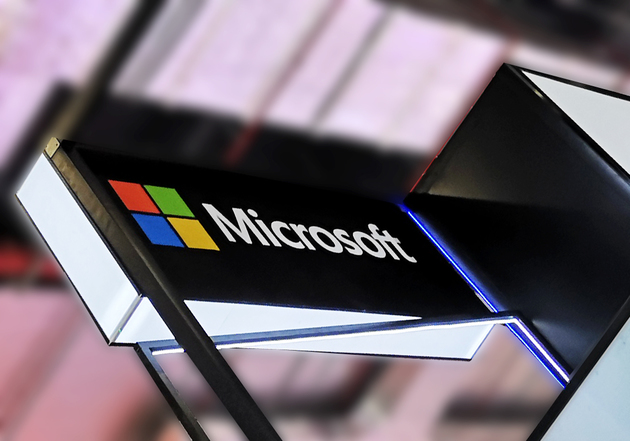
File Photo/NBD
On June 11th, Microsoft announced on its official website that it will discontinue the Copilot GPTs service starting July 10th, 2024. Additionally, all existing Copilot GPTs and related data created by users will be deleted. This decision has sparked significant dissatisfaction among users. Microsoft’s official explanation is that the company is undergoing strategic adjustments and will shift the focus of GPT to commercial and enterprise scenarios, possibly due to a lack of commercial returns.
Microsoft Official Announcement: Copilot GPTs Service to End Next Month
Recently, Microsoft declared that the GPT Builder feature will be removed from the Copilot Pro service on July 10th, just three months after its launch. GPT Builder, also known as Copilot GPT, allowed subscribed users to create personalized GPT models using documents, external or internal resources, and custom instructions.
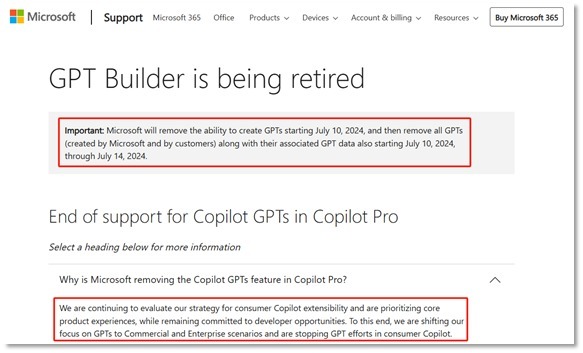
Photo/Microsoft Official Website
Microsoft explained that this decision prioritizes the core product experience and shifts the focus of GPT to business and enterprise scenarios. Consequently, they will cease support for the consumer version of Copilot’s GPT.
In the official announcement, Microsoft stated, “We will continue to evaluate the scalability strategy of the consumer version of Copilot and prioritize the core product experience while remaining committed to providing opportunities for developers. To this end, we are shifting the focus of GPT to business and enterprise scenarios and discontinuing the GPT work in the consumer version of Copilot.”
For Microsoft, GPTs are considered peripheral products, not core, with the strategic focus on B2B rather than B2C.
Notably, at the Build 2024 developer conference held at the end of May this year, Microsoft introduced Team Copilot, expanding the original Microsoft 365 personal AI assistant into a team AI assistant. This indicates Microsoft’s increased focus on the development of team collaboration and enterprise application scenarios.
However, Microsoft’s removal of Copilot GPTs has caused strong dissatisfaction among users. They believe that Microsoft’s sudden announcement of the feature’s discontinuation during the use of GTP Builder is highly irresponsible. Some users are even considering canceling their Copilot Pro subscriptions.
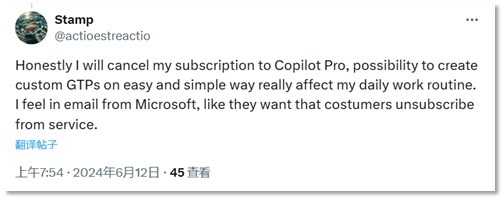
Photo/X
AI expert and Wharton School professor at the University of Pennsylvania, Ethan Mollick, also expressed surprise at this move, noting that it could hinder grassroots users’ innovation.
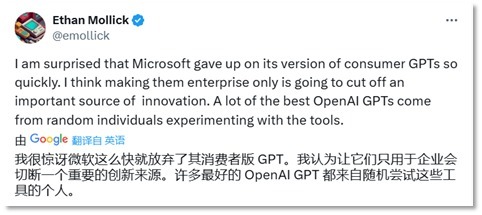
Photo/X
Feature Overview: Copilot GPT Builder
According to the Microsoft official website, Copilot Pro subscribers can use Copilot GPT Builder to create, edit, and publish their own Copilot GPTs. Copilot GPT acts like a customized intelligent assistant, similar to the custom GPT Builder and GPT Store invested in by Microsoft through OpenAI.
Copilot GPT Builder can be used for specific tasks, such as providing expertise, performing certain tasks, or saving time by reusing a set of instructions. For example, a Copilot GPT assistant for grocery shopping can generate a shopping list based on the user’s meal plan.
When users share the link to their custom Copilot GPT with others, it can be used without a Copilot Pro subscription. Only the user themselves can edit their Copilot GPTs, so there’s no worry about others altering or deleting them. Additionally, users can choose to stop sharing their Copilot GPTs.
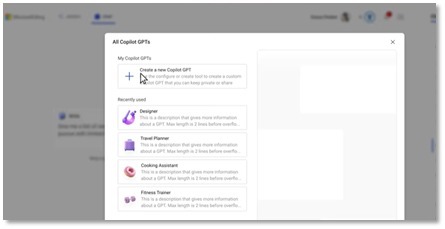
Image Source: YouTube Microsoft Official Account
Copilot GPT Builder features a ‘Create’ tab for generation and a ‘Configure’ tab for further customization, including Retrieval-Augmented Generation (RAG) for integrating external data and toggling web browsing and image generation features.
However, all these customized GPTs will become inaccessible after July 14th, 2024.
Reasons for Discontinuation: Competition with OpenAI? Lack of Profitability?
The announcement to discontinue the GTP Builder feature just three months after its launch has led to much speculation.
Some netizens suggest that this may be because Microsoft does not want to compete with OpenAI, in which it has invested, on homogeneous products. This incident reflects the complex relationship between the two entities.

Photo/X
A more likely speculation is that Microsoft wishes to temporarily restrict its consumer AI services to a set range of functions, unwilling to invest further without seeing commercial value.
Foreign media reports that, so far, Microsoft has mainly benefited from the hype around AI by accelerating the development of cloud computing and adding AI features to current software (such as Teams and Office for businesses).
Despite the hype by Microsoft CEO Satya Nadella, the company’s efforts to snatch market share from Google search through the Bing chatbot have been unsuccessful.
Consumers seem uninterested in using chatbots as a replacement for search engines, or Microsoft’s products are simply not sufficient to change their habitual behaviors.
Moreover, Microsoft’s consumer products have been overshadowed by the spotlight on ChatGPT. Adding to Microsoft’s disappointment, even ChatGPT itself has not seen any network growth in recent months.
Additionally, OpenAI’s CustomGPT has not been a success story—they have not stimulated new growth, and the GPTs have yet to find a viable business model, with their promised monetization capabilities still unrealized.

Photo/X
While users creating their own GPTs is a positive development, for Microsoft, managing and ensuring the quality of these contents seems too burdensome, especially as users may upload a significant amount of sensitive data.
Furthermore, OpenAI also offers similar services for free within ChatGPT.


 川公网安备 51019002001991号
川公网安备 51019002001991号





